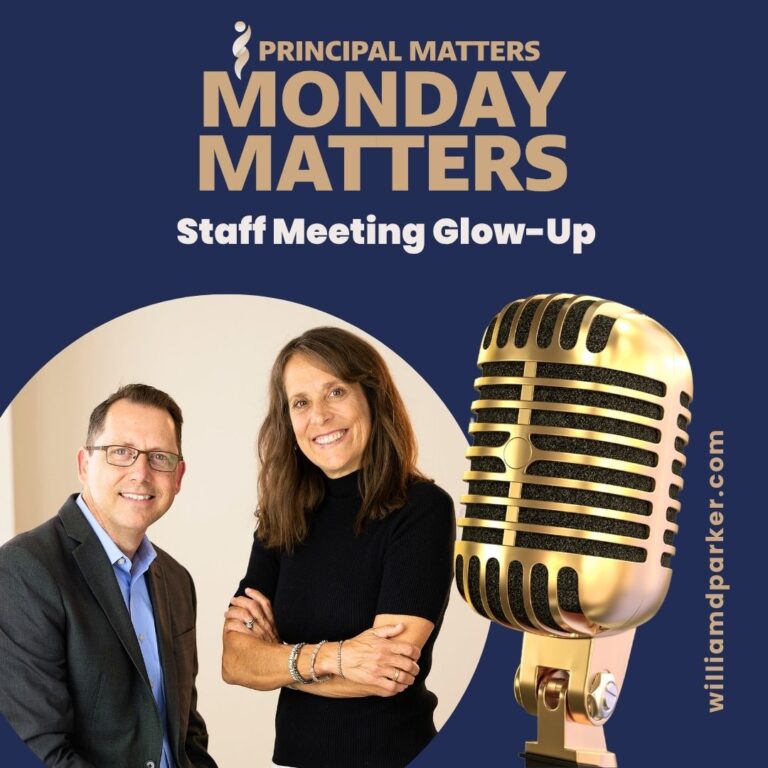Podcast: Play in new window | Download
As a child, I had the privilege of observing my grandparent’s farming responsibilities, so this week’s conversation with Jen Schwanke is important to me personally and professionally. In it, we discuss a documentary about traditional farming methods, and we draw connections between producing healthy soil and cultivating strong school cultures.
How might the story of one farm inform our work as education leaders? What are the ecosystems of your school community that make up the important soil or culture of your school?
Listen to the entire episode for takeaways on these questions and more. Here is a summary of this week’s conversation:
This week’s episode draws inspiration from the documentary “The Biggest Little Farm,” which details John and Molly Chester’s efforts to rehabilitate a 200-acre farm named Apricot Lane Farms. Their mentor, Alan York, guided them through numerous challenges, such as wildlife threats and soil rehabilitation, emphasizing that simple solutions are not always easy. The farm now thrives, featuring productive produce sales and popular tours.
In school leadership, we reflect on the complex ecosystem of school communities, including student populations and staff morale. For instance, Dr. Anthony Muhammad’s insights on transforming school culture highlight the need for diverse leadership roles in schools, such as decision-makers and communicators (see his book Transforming School Culture, Solution Tree Press). Cultivating a positive school culture is emphasized, focusing on relationship-building, rigorous learning, and creative outcomes.
Other leadership lessons discussed include the value of commitment to foundational principles, the role of observation and creativity in problem-solving, and managing educational tasks effectively. An example given is Jen’s approach to handling groundhogs with a farm dog, illustrating the cycle of traditional farming. The segment also stresses the importance of maintaining a healthy school culture and filtering out toxic behaviors to foster a conducive learning environment.
Thank you for listening to the entire episode for more reflections, or you can read a more comprehensive explanation in the post below. Thank you again for doing what matters!
Below is a full version of my reflections for more context and references:
Simplicity in Leadership Does Not Equal Easier
By William D. Parker, September 23, 2023
When John and Molly Chester founded Apricot Lane Farms in 2011, in Moorpark, California, they were taking on the daunting task of rehabilitating and redesigning more than 200 acres of land that had been abandoned by previous farming attempts. The soil, which had once boasted orchards, was now dead. An irrigation pond was empty. With the help of an older farmer, Alan York, who became their mentor, they envisioned a traditional-style farm, with a vast variety of fruit trees, and a blend of farm animals including ducks, chickens, pigs, sheep, and cows.
The task of rehabilitating the soil was their number one job. With the help of an investor and the enthusiasm of a team of like-minded young people interested in traditional farming, they began installing a robust composting system, refilling the irrigation pond, and introducing animals back to the farm.
John Chester, also a filmmaker, captured the story of their journey through the documentary, The Biggest Little Farm, which chronicles the first seven years of the farm’s new life — its trials, failures, discoveries — and eventually, its flourishing.
When their mentor, Alan York, advised them on the design and vision for traditional farming, he encouraged them to focus on diversity and complexity. By composting, introducing animal life, and rehabilitating soil for growing cover crops, the Chesters cultivated an ecosystem that would sustain fruit trees, egg production, and animal husbandry.
The benefits, however, would not come without their costs. In the first few years, the Chesters experienced enormous growth as cover crops grew and animals grazed, but they faced many setbacks including wildlife killing ducks and chickens, snails devouring the leaves of orchard trees, sick animals, and birds destroying their fruit. With each setback, the Chesters had to reevaluate and decide what part of the farm could be productive while another part was being damaged.
The inspiring part of their story is their undying optimism and reflection in the face of diversity. Alan, their mentor, became sick and could no longer help them. Their mother pig, Emma, becomes deathly ill. Chickens are being killed by coyotes by the dozens. Gophers are destroying fruit trees. The Chesters, however, continue monitoring and adjusting, nourishing the soil with compost and water, and allowing the crops and animals to work together in creating a healthier ecosystem.
As John’s voice narrates in his documentary of the farm, “Co-existences can’t be forced. It’s a delicate, patient dance. Ducks eat snails, chickens eat maggots…” Eventually, the systems created among the soil, trees, and animals reach a tipping point. Chickens begin eating garden pests, natural predators like owls begin killing gophers, ladybugs arrive to protect plants from aphids, and hawks protect the trees from fruit-eating birds.
Alan York eventually dies from cancer, but his legacy bears fruit as the farm begins to flourish. Early on, he told the Chesters that diversity and complexity in the ecosystem of their farm would eventually lead to simplicity. He cautioned them, though, that “Simple does not mean easy.” By the seventh year of the farm, Alan’s words became reality. The return of a healthy cover crop meant rains were captured and stored in the farm’s aquifer system instead of lost in run-off. The bounty of fruit trees brought back pollinating bees. The ranging animals added natural fertilizer to the soil with their droppings.
Today, Apricot Lane Farms is a bountiful traditional farm that sells produce throughout northern California. Tours of the farm are sold out each season. John and Molly Chesters’ dreams of traditional farming continue today with constant care, problem-solving, and intentionality in maintaining a healthy ecosystem.
Reflection for School Leaders
I’d like to take a moment to reflect on how their story may inform our work as education leaders. What are the ecosystems of your school community that make up the important soil or culture of your school? When I posed this question to a group of school leaders recently, they were quick to respond:
- Student populations
- Teacher mindsets
- Staff morale
- Parents
- Leadership support
- Political and institutional forces
- Shared expectations
- History
In Anthony Muhammad’s Transforming School Culture: How to Overcome Staff Division, Second edition, 2018, he talks about the difference between “fixing” and “transforming” school culture. He warns readers that “best practices” do not work in unhealthy school cultures (pages 24-29).
If like Chester’s farm, the complexity and diversity of an ecosystem eventually lead to simplicity but not ease, how might we as leaders approach the systems we are developing in our schools that nourish the culture of the school for better outcomes?
When I talk to school leaders about their schools, we often discuss pressing needs, staff morale, or scenarios involving difficult choices. These common challenges reflect the real-life work of leadership. School leaders wear so many hats in their work: they are called upon to be decision-makers, deep-listeners, accountability partners, team-builders, communicators, servant-leaders, and individuals. The tasks can be as daunting as the work is important.
The foundation of it all, however, comes back to the soil of the school, the ecosystem created in relationships, rigorous learning, and creative outcomes – our school culture. This week as you face the landscape in front of you, it is okay to admit it is hard work to take complexities and diversities and turn them into simplicity. That’s the goal of a flourishing farm with a healthy ecosystem. Let’s make it the goal of growing a flourishing school community.
Let’s Wrap This Up
When I first watched the documentary, The Biggest Little Farm, I was skeptical of the Chesters’ ambitions. But as the story unfolded, I was inspired by their commitment to the culture of their farm – their dedication to the foundational principles of cultivating healthy soil, and introducing cycles of nourishment, and rehabilitating farming practices. I was also struck by their reflective leadership.
Many times these young farmers faced situations where they were unsure how to find short-term or long-term solutions. For instance, when gophers were destroying the root systems of their fruit trees, it seemed impossible to rid the orchards of these pests. As John Chester explains in the documentary, he began to “take a step back and watch.” And observation was followed by creativity. He decided to install owl nests around the farm, and soon these natural predators were killing enough gophers to protect the root systems and save the trees.
Over and over, this became the pattern: a commitment to their principles of traditional farming while walking, observing, thinking, and problem-solving.
In education, our policies, procedures, calendars, observations, evaluations, counseling sessions, disciplinary assignments, parent meetings, and game observations are more than tasks on a to-do list. In a healthy school culture, where teachers and staff believe all students can learn, where respect and dignity for others are the hallmark of a school, where complex thinking and problem-solving are expected and encouraged — these systems, embedded in a culture that is constantly filtering out toxic behaviors, produce a healthy atmosphere for student learning.
Now It’s Your Turn
- What systems describe a healthy or toxic school culture?
- How can you intentionally nourish the environments most conducive to strong student outcomes?
- What is one action you can take today that leads to more simplicity for your school community without the false belief that simplicity equals easier?




